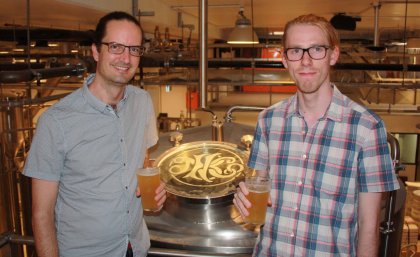
University funds brewing efficiency research
The growing craft beer industry is about to hop ahead with new University of Queensland research supported by the Queensland Government.
UQ School of Chemistry and Molecular Biosciences PhD student Edward Kerr has been awarded an Advance Queensland PhD scholarship to work with Newstead Brewing Co in Brisbane improving efficiency in craft beer production.
“It’s a dream PhD because it’s on an interesting topic with some fascinating science involved and the chance to transfer this knowledge to industry,” Mr Kerr said.
“Beer is the world’s oldest and mostly widely consumed alcoholic drink, and it was brewed as long ago as 9500 BC.
“Although it’s an established industrial process, many details of the underlying biochemistry are unknown, which can lead to severe inefficiencies and product variability.
“My project aims to understand how differences in yeast and malt can influence the biochemistry, production and product qualities of beer.”
Mr Kerr’s supervisor, Dr Ben Schulz, said the project would use new scientific approaches to improve process efficiency and product quality.
“We aim to discover novel wild yeasts from Brisbane for use in beer fermentation and investigate how their diversity affects beer production and quality,” Dr Schulz said.
“The project will integrate several techniques to investigate changes in yeast behaviour affecting process control during long fermentations.”
Newstead Brewing chief executive Dr Mark Howes said the company was pleased to have UQ’s scientific input to help its business.
“I come from a research background myself, with a PhD in molecular bioscience from UQ and I appreciate the edge that a fresh scientific approach will bring to our industry,” he said.
“Throughout the project, the insights gained into the beer-making process will be integrated into our microbrewery production facility.
“We hope the project can discover and use Queensland’s microbial diversity, improve efficiencies in barley production and use, and develop more knowledge for our growing industry.”




